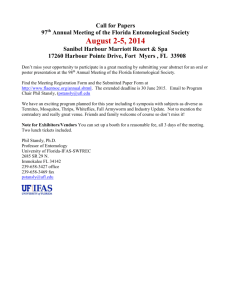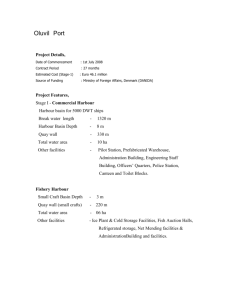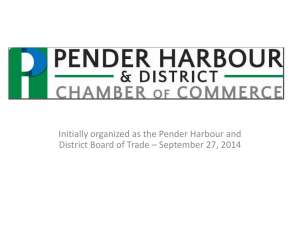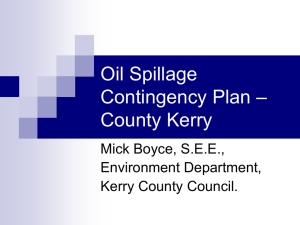TSE Symbol: Manager Commentary
advertisement
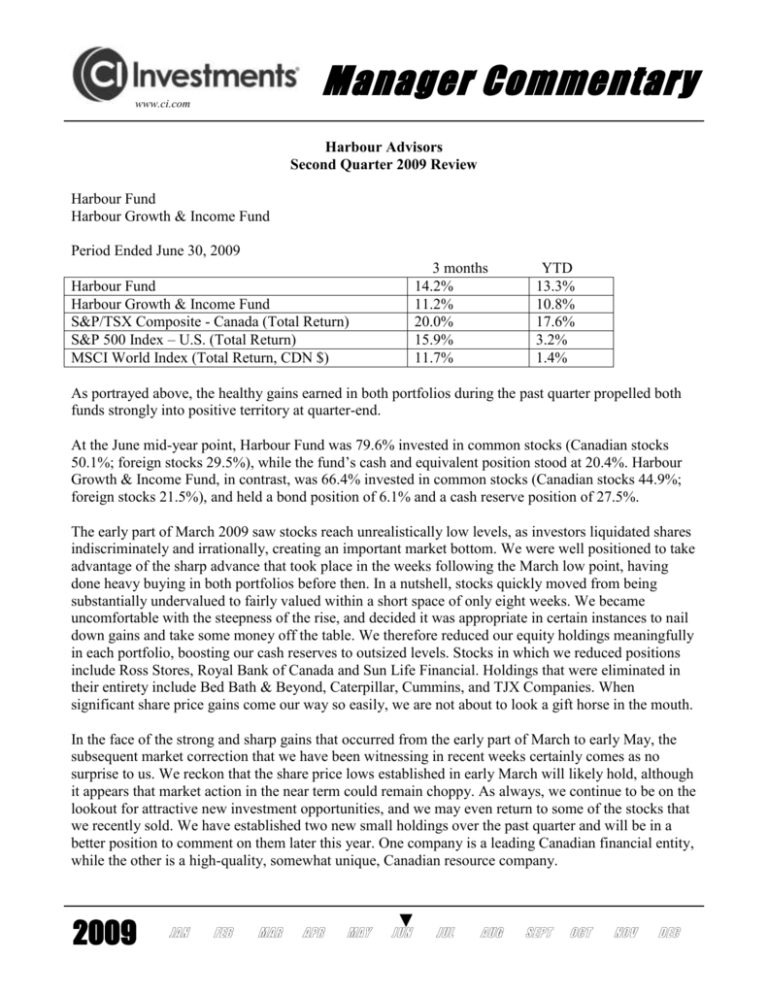
Manager Commentary www.ci.com Harbour Advisors Second Quarter 2009 Review Harbour Fund Harbour Growth & Income Fund Period Ended June 30, 2009 Harbour Fund Harbour Growth & Income Fund S&P/TSX Composite - Canada (Total Return) S&P 500 Index – U.S. (Total Return) MSCI World Index (Total Return, CDN $) 3 months 14.2% 11.2% 20.0% 15.9% 11.7% YTD 13.3% 10.8% 17.6% 3.2% 1.4% As portrayed above, the healthy gains earned in both portfolios during the past quarter propelled both funds strongly into positive territory at quarter-end. At the June mid-year point, Harbour Fund was 79.6% invested in common stocks (Canadian stocks 50.1%; foreign stocks 29.5%), while the fund’s cash and equivalent position stood at 20.4%. Harbour Growth & Income Fund, in contrast, was 66.4% invested in common stocks (Canadian stocks 44.9%; foreign stocks 21.5%), and held a bond position of 6.1% and a cash reserve position of 27.5%. The early part of March 2009 saw stocks reach unrealistically low levels, as investors liquidated shares indiscriminately and irrationally, creating an important market bottom. We were well positioned to take advantage of the sharp advance that took place in the weeks following the March low point, having done heavy buying in both portfolios before then. In a nutshell, stocks quickly moved from being substantially undervalued to fairly valued within a short space of only eight weeks. We became uncomfortable with the steepness of the rise, and decided it was appropriate in certain instances to nail down gains and take some money off the table. We therefore reduced our equity holdings meaningfully in each portfolio, boosting our cash reserves to outsized levels. Stocks in which we reduced positions include Ross Stores, Royal Bank of Canada and Sun Life Financial. Holdings that were eliminated in their entirety include Bed Bath & Beyond, Caterpillar, Cummins, and TJX Companies. When significant share price gains come our way so easily, we are not about to look a gift horse in the mouth. In the face of the strong and sharp gains that occurred from the early part of March to early May, the subsequent market correction that we have been witnessing in recent weeks certainly comes as no surprise to us. We reckon that the share price lows established in early March will likely hold, although it appears that market action in the near term could remain choppy. As always, we continue to be on the lookout for attractive new investment opportunities, and we may even return to some of the stocks that we recently sold. We have established two new small holdings over the past quarter and will be in a better position to comment on them later this year. One company is a leading Canadian financial entity, while the other is a high-quality, somewhat unique, Canadian resource company. 2009 Manager Commentary www.ci.com There has been no change in our thinking with regards to the bond market and we continue to believe that the risk-reward ratio for fixed-income investors remains poor. As such, Harbour Growth & Income Fund continues to carry a minimal bond weighting. As we anticipated, interest rates have been on the rise in both Canada and the U.S. this year, with 10-year, Government of Canada bond yields up 67 basis points at quarter-end, while comparable United States, 10-year Treasury bond yields advanced 129 basis points. Nothing has altered our optimism for decent long-term returns in each fund portfolio; however, we do believe that this is clearly a time to be strongly disciplined and highly selective with regard to one’s investment choices. Both Harbour portfolios are stocked with high-quality, well-financed, best-ofbreed Canadian and international companies. We look forward to reporting to you again in the fall. Gerry Coleman Portfolio Manager July 16, 2009 Harbour Foreign Equity Corporate Class Harbour Foreign Growth & Income Corporate Class Year-to-date and second quarter 2009 results for the Harbour Foreign Equity Corporate Class and the Harbour Foreign Growth & Income Corporate Class are shown below with comparable results for the leading benchmark indexes. Period Ended June 30, 2009 Harbour Foreign Equity Harbour Foreign Growth & Income MSCI World Index (CDN $) MSCI World Index (local return) S & P 500 (in U.S. dollars) Q2 19.9% 13.3% 11.7% 16.8% 15.9% YTD 12.8% 8.5% 1.4% 5.2% 3.2% As depicted above, both funds recorded strong absolute and relative performance over the past three months. At quarter-end, Harbour Foreign Equity had 85% of its assets invested in common stocks, while the fund’s cash and equivalent position amounted to 15%, up roughly eight percentage points from the prior quarter’s end. The geographic exposure was as follows: U.S. (15 companies) 31.3%, Western Europe (11 companies) 30.1%, U.K. & Ireland (four companies) 12.1%, Asia Pacific (four companies) 8.5% and Brazil (one company) 3 %. 2009 Manager Commentary www.ci.com The depressed valuation levels accorded to many of our holdings at the start of the year helped set the stage for some dramatic stock price increases after the early March market lows. In some cases, the advances were in excess of 100%, which prompted some selective pruning within the portfolios. Positions in Baldor Electric, Kingspan, Petrobras, Ross Stores, and Travis Perkins were all trimmed during the quarter. Positions completely eliminated included Allied Irish Banks and American Eagle Outfitters – both small positions at the time of exit. We continued to build our position in CVS Caremark, a new holding during the first quarter, and took advantage of price weakness to bolster our positions in long-term holdings Diageo, and Nestle. With regard to new holdings, two were established during the quarter. One a small, Danish industrial firm; the other a large, U.S. based multinational financial services company. The Danish holding, which remains undisclosed as we are still building the position, is the result of a recent research trip to Europe. During the week-long trip, we visited 22 companies in Copenhagen, London, Stockholm, and Madrid. As is usually the case on similar trips, a handful of the meetings were with companies in which we are invested – Stockholm-based Atlas Copco and Hennes & Mauritz (H&M) would be examples; others were potential investment opportunities for Harbour. The other new holding is MasterCard, a brief description of which follows: MasterCard Inc., based in Purchase, New York, is a leading global payment solutions company whose principal activities support the credit, debit and related payment programs of over 24,000 financial institutions around the world. The MasterCard Worldwide Network processes both credit and debit type transactions on a current outstanding base of over 950 million cards. Brands include MasterCard, MasterCard Electronic, Maestro, and Cirrus. MasterCard generates revenues from the fees that it charges its customers for providing transaction processing and other payment related services, and by assessing its customers a fee based primarily on dollar volumes Harbour Foreign Growth & Income ended the quarter with 67% of its assets invested in common stocks and 11% in bonds. The remaining 22% was held in cash and equivalents. The focus of this fund in recent quarters has been to boost its exposure to stocks. The rationale is that from a longer-term perspective, stocks were the hands down investment of choice relative to bonds; and while stock valuations aren’t as cheap as they were last fall, this view hasn’t changed. What also hasn’t changed is our vision of higher inflation and interest rates down the road – two massive hurdles for bond price advancement. All that said, we continue to look for opportunities in high-quality corporate bonds and select sovereign credits, with the intent of providing a more representative balance of bonds within the portfolio. As we enter the second half of 2009, we continue to be optimistic with regard to our foreign portfolios. We continue to uncover attractive new investment opportunities and our global watch list of researched companies has never been as extensive. In addition, our portfolios are well positioned with goodquality, competitively advantaged global businesses that possess the ability to grow at above-average 2009 Manager Commentary www.ci.com rates over the long term. Finally, our recently expanded cash reserves will provide us the dry powder needed if and when opportunities arise in the weeks and months ahead. We look forward to reporting to you again in three months time. Stephen F Jenkins, CFA Portfolio Manager Commissions, trailing commissions, management fees and expenses all may be associated with mutual fund investments. Please read the prospectus before investing. Mutual funds are not guaranteed, their values change frequently and past performance may not be repeated. This commentary is provided as a general source of information and should not be considered personal investment advice or an offer or solicitation to buy or sell securities. 2009

